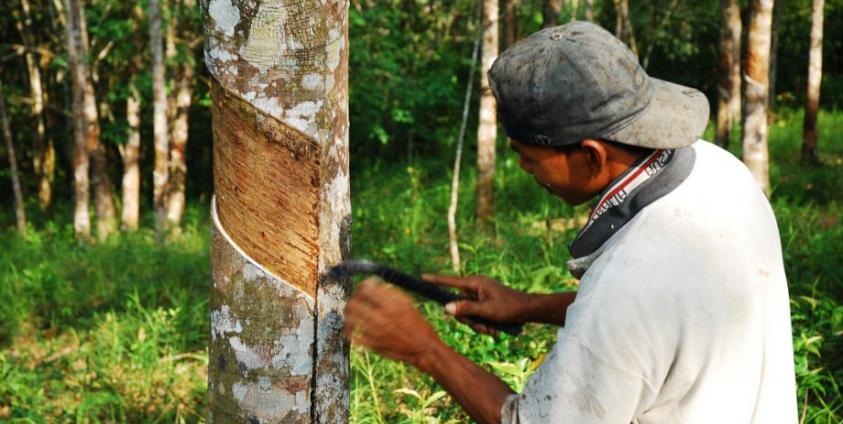Rubber entrepreneurs report almost half of the rubber plantations are now facing a situation where they won't be able to tap rubber this year because of the intense conflict in Mon State ,the primary rubber-producing region in the country
Rubber, known as "white gold" for its white latex, is a significant product of Mon State, with more than 500,000 acres of rubber plantations. Each year, over 300,000 acres are tapped, resulting in a production of more than 100,000 tons of rubber.
However, this year, the majority of rubber farms in Kyaikto and Bilin townships, including Ye township, which is the leading rubber producer in Mon State, are grappling with the prospect of being unable to carry out rubber tapping. Moreover, certain areas in Kyaikmaraw, Thaton, Paung, and Thanbyuzayat townships are contemplating the suspension of rubber farming activities due to security concerns.
The rubber plantation industry is on the verge of closure due to the ongoing conflicts between the Military Council troops and revolutionary forces. The industry also faces challenges such as the inability to hire skilled workers and the constraints imposed by the Military Council's night-time curfew.
"At present, rubber farmers are enduring great hardship. Owing to security concerns, laborers are unable to work. For instance, those engaged in rubber tapping in Kyainseikgyi have had to flee. The situation is especially dire in Ye, Bilin, and Kyaukto. Previously, rubber tapping spanned around 300,000 acres, but due to the challenging security conditions, it has dwindled to just three out of the ten townships. Numerous plantations are now idle, and rubber tapping is at risk of coming to a halt," an official from the Mon State Rubber Planters and Producers Association. informed Than Lwin Times.
The rubber plantation industry in Mon State typically runs from mid-September to the end of May each year. However, this year, it faced significant delays, with many rubber plantations unable to resume operations until the end of October. These delays were primarily caused by challenges related to hiring skilled workers and ongoing conflicts.
Since the third week of October, there have been ongoing clashes between military council troops and armed resistance forces in Mon State's townships of Ye, Kyaukto, and Bilin. These conflicts have resulted in the displacement of entire villages, with residents forced to flee due to the violence.
A rubber farmer informed Than Lwin Times that ongoing fighting in the region will lead to the suspension of rubber tapping operations, resulting in what is expected to be a nearly 50% reduction in rubber yield.
" Most of them can't do rubber tapping on farms in the mountains. Some farms have ceased rubber tapping due to a shortage of labour. Moreover workers are reluctant to travel from one area to another. For them to return, the situation in those areas needs to stabilize. In the event of conflict, they typically wait for about a week. Afterwards they may take the risk and resume rubber tapping. I expect that rubber production will decrease by approximately half," he said.
Under these circumstances, although rubber prices were promising at 1700 to 1800 kyat per pound at the beginning of the rubber season, farmers are suffering losses due to their inability to conduct rubber tapping.
Mon State primarily exports its annual rubber raw material production to China and Thailand, generating millions of US dollars in revenue from the rubber sector. However rubber experts have expressed concerns that Mon State's rubber sector could incur substantial losses due to regional instability, compounded by elevated general costs since the coup that affects essential imports.







